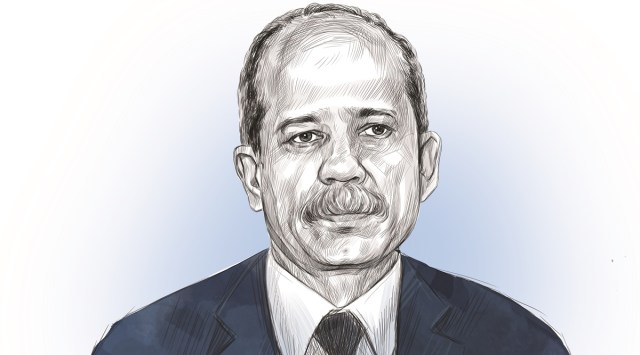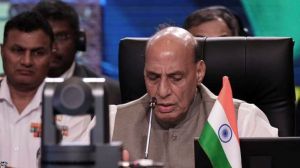Stay updated with the latest - Click here to follow us on Instagram
Govt’s negative perception is stamp of my independence, says CJ Kureshi
Justice Kureshi made the remark referring to some observations made by a former chief justice of India in his biography, explaining why the Rajasthan CJ’s recommendations on the appointment of the CJs of the Madhya Pradesh and Tripura high courts were rejected.
 Justice Akil Kureshi.
Justice Akil Kureshi.Bidding an emotional farewell, Rajasthan High Court’s outgoing Chief Justice Akil Kureshi Saturday said he considers the “government’s negative perception” of him a certificate of independence, and that he leaves with his “pride intact” and “conscience clear”.
🗞️ Subscribe Now: Get Express Premium to access the best Election reporting and analysis 🗞️
As Justice Kureshi demits office, Justice Manindra Mohan Shrivastava, the most senior judge of the Rajasthan High Court, will take charge as Acting Chief Justice from Monday.
In his address, Chief Justice Kureshi said: “Recently a former Chief Justice of India has written his biography. I have not read it but going by the media reports, he has made certain disclosures. Regarding changing my recommendation for Chief Justice of Madhya Pradesh High Court to Tripura High Court, it is stated that the government had some negative perceptions about me based on my judicial opinions. As a judge of the constitutional court whose most primary duty is to protect the fundamental and human rights of the citizens, I consider it a certificate of independence.”
“What is of greater significance to me is what was the perception of the judiciary,” Justice Kureshi added. The statement underlined that the Supreme Court collegium did not refute the government’s “perception” and withdrew its recommendation appointing Justice Kureshi as Madhya Pradesh HC Chief Justice.
Though Justice Kureshi did not name the CJI, he was referring to former Chief Justice of India Ranjan Gogoi’s autobiography Justice for the Judge which was released in December.
Referring to Gogoi’s book, J Kureshi says the government’s perception is a certificate of independence but would have wanted to know the judiciary’s views on him (which is conveniently not in the book) pic.twitter.com/1sSDUnnfd2
— Apurva Vishwanath (@apurva_hv) March 5, 2022
Justice Kureshi’s stint as a judge began in 2004 — after almost 20 years at the Bar — when he was appointed Additional Judge of the Gujarat High Court. He became a permanent Judge in 2005.
As per the convention of seniority, he was expected to become acting Chief Justice of the Gujarat HC when the post fell vacant in November 2018. But the government, in a notification, appointed his junior, Justice A Dave, instead. After protests from the Bar, the notification was withdrawn and Kureshi was transferred to the Bombay High Court, where he would be fifth in seniority. In May 2019, the government sent back the Collegium’s recommendation to appoint him as Chief Justice of the Madhya Pradesh High Court instead.
He eventually took oath as Chief Justice of the High Court of Tripura in November 2019, and as the Chief Justice of the Rajasthan High Court in October 2021.
One of the reasons for the two-year impasse over appointment of judges to the top court is said to have been the Collegium not including Justice Kureshi’s name for elevation — despite him being No. 2 in the all-India seniority list for high court judges at the time of his stint in Tripura.
Supreme Court judge Justice Rohinton Nariman, who reportedly insisted on it, retired on August 12 last year; the Collegium’s list of nine came just five days later.
“Do I have any regrets? None at all. Each decision of mine was based on my legal understanding. I’ve been wrong, was proved to be wrong on many occasions but never once have I decided something different from my legal belief,” Justice Kureshi said Saturday.
“I leave with my pride intact that I made no decision based on its consequences for me. Some people believe I should have made further progress. But it depends on what you might consider to be progress. The support, love and affection that I have got from lawyers and colleagues wherever I went far outweighs any perceptible progress. I would not barter this for anything,” he said.
“If ever I have to make a choice between the affection from all of you, and the so-called progress, I would gladly choose the former,” he said, his voice choking.
During his time in the Gujarat High Court, Justice Kureshi had given two important verdicts. In 2010, he set aside a trial court order and granted the CBI two-day custody of then Gujarat Home Minister and now Union Home Minister Amit Shah in the Sohrabuddin Sheikh encounter case. (In 2014, Shah was cleared in the case by a Special CBI Court.)
In 2011, a Bench headed by Justice Kureshi upheld the then Gujarat Governor Kamla Beniwal’s decision to appoint former High Court judge R A Mehta as the state’s Lokayukta. It had been opposed by CM Modi.
On Saturday, Justice Kureshi said: “The very reason for (the) existence of the courts is to protect the rights of the citizens. Far more than any direct affronts, it is stealthy encroachment on democratic values and rights of the citizens which should worry us.”
“So far, there have been 48 Chief Justices of India, but when we talk of courage, sacrifice to uphold the rights of the citizens, we remember one who should have, but never did become the Chief Justice of India — Justice H R Khanna will always be remembered for his shining lone dissenting voice in ADM Jabalpur (case),” he said.
He also said judges are overworked and expressed surprise at the SC pruning lists of advocates for appointment to HCs. “When I joined, there were 36 judges in my High Court. I do not think this number has been crossed since. During this period, work has increased manifold. It puts an inhuman burden on the judges and it has its burnout effect,” he said.
“It is surprising to see the lists of advocates recommended by the High Court for appointment being pruned heavily by the Supreme Court. Whatever be the reason for this difference in perception between the High Courts and the Supreme Court, it must be quickly resolved or else we will find it increasingly difficult to persuade good advocates to join the bench,” said the outgoing CJ.
To young lawyers, he said: “Live by your principles because success is sweeter when you reach your destination through (the) straight path. Failure which is a product of principled living is more satisfying than success which is founded on compromises. And yes, be kind and gentle to others because life is too short to fill it up with hatred and distrust.”
Towards the end of his address, Justice Kureshi fought back tears as he looked back on his 18-year career.
He said he had been absent from family duties and several occasions over the last 18 years on account of court work, and that his family had covered for him. “They performed the duties which I should have…In trying to be faithful to my oath, I have done injustice to them (family)” he said, taking off his glasses and dabbing his eyes with a kerchief some moments later.







